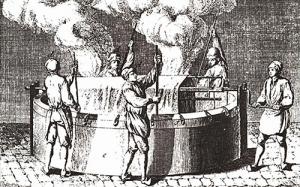The growth of the skilled workforce in London, 1500-1750

During this period London's population grew tenfold, but that increase was more than matched by an expansion in the range of skills practised by its inhabitants, in both manufacturing and services. London was transformed from a city where the highest quality products and the most up-to-date skills tended to be imported from overseas, to a metropolis whose inhabitants could make technical and luxury commodities to standards which enabled them to dominate the world market. The study aims to define this change, and to examine why Londoners came to behave in this way. How were the new skills acquired? What was the significance of immigration and of ethnic or religious affiliation? What part did formal systems of education and training, the guild structure, and government policy play in the process? What were the attitudes of craftsmen and intellectuals to these developments and to innovation in general? The study forms part of 'The Achievement Project: intellectual and material culture in modern Europe' which is funded by the Renaissance Trust.
See also the related projects 'Optical glass and the scientific instrument trade in London before 1750', 'From craft to industry; London's scientific instrument makers' workshops 1780-1820' and 'Image database of the skilled workforce in early modern London'.
Publications
Rob Iliffe, '"In the Warehouse": privacy, property and priority in the early Royal Society', History of Science, 30 (1992), 29-62; Rob Iliffe, '"Rhetorical Vices": outlines of a Feyerabendian History of Science', History of Science, 30 (1992), 199-219; Rob Iliffe, '"Author-mongering": the "Editor" between producer and consumer in the late seventeenth and early eighteenth centuries', in A. Bermingham and H. Brewer (eds.), Consumption and Culture in the Eighteenth Century (University of California Press, 1992); Rob Iliffe, 'Max Weber and the Japanese work ethic', Achievement Project Newsletter, 2 no. 1 (1992), 2-7; Rob Iliffe, 'Mécanique célèste de Newton', Les Cahiers de Science et Vie (February 1993), 40-68; Rob Ilifee, '"Aplatisseur du monde et de Cassini": Maupertuis, precision measurement, and the shape of the Earth in the 1730s', History of Science xxxi(1993), 335-75; Rob Iliffe, '"Ce que Newton connut sans sorti de chez lui": la mesure de la figur e de la terre en France, 1700-1750', Histoire et Mesure, 4 (1994), 1-41; David Mitchell, 'Dressing plate by the "unknown" London silversmith "WF", The Burlington Magazine, 135, No. 1083 (June 1993), 386-400; David Mitchell, '"Mr Fowle pray pay the washwoman": the trade of a London goldsmith-banker, 1660-1692', Business and Economic History, 23 no. 1 (1994), 27-38; Rob Iliffe, '"Making a Shew": apocalyptic hermeneutics and anti-idolatry in the work of Isaac Newton and Henry More', in R. Popkin and J. Force (eds.), The Books of Nature and Scripture: Recent essays on Natural Philosophy, Theology and Biblical Criticism in the Netherlands of Spinoza's Time and the British Isles of Newton's Time (Dordrecht, 1994), 55-88; Rob Iliffe, '"Is he like other men?" The meaning of the Principia Mathematica and the author as idol', in G. Maclean (ed.), Culture and Society in the Stuart Restoration (Cambridge, 1995), 159-176; Michael Berlin and A. Werner, 'Developing an interdisciplinary approach: the skilled workforce project', Bulletin of the John Rylands Library (February 1995); Rob Iliffe, '"That puzleing Problem": Isaac Newton and the Political Physiology of Self', Medical History 39 (1995), 433-458; Rob Iliffe, 'Material doubts: Hooke, artisan culture and the exchange of information in 1670s London', British Journal of the History of Science, 28 (1995), 285-318; Rob Iliffe, '"Working bodies": Protestantism, the productive individual and the politics of idleness' in P. Gouk (ed), Wellsprings of Achievement (Scolar Press, 1995), 135-158; Lien Bich Luu, 'Aliens and their impact on the goldsmiths' craft in London in the sixteenth century' in D. Mitchell (ed), Goldsmiths, Silversmiths and Bankers (CMH, 1995), 43-52; Lien Bich Luu, 'Assimilation or segregation: colonies of alien craftsmen in Elizabethan London', in R. Vigne and G. Gibbs (eds), The Strangers' Progress: Integration and Disintegration of the Huguenot and Walloon Refugee Community, 1567-1889. Essays in memory of Irene Scouloudi (Proceedings of the Huguenot Society, 26 (2), 1995), 160-172; David Mitchell (ed.) Goldsmiths, Silversmiths and Bankers: Innovation and the Transfer of Skill, 1550 to 1750 (CMH, Working Papers Series, no. 2, 1995); David Mitchell, 'Innovation and the transfer of skill in the goldsmiths' trade in Restoration London' in D. Michell (ed.) Goldsmiths, Silversmiths and Bankers , 5-22; Lien Luu, 'Migration and change: religious refugees and the London economy, 1550-1600', Critical Survey, 8 (1996), 93-102; David Mitchell, '"Good hot pressing is the life of all cloth": dyeing, clothfinishing and related textile trades in London, 1650-1700', in H. Diederiks and M. Balkestein (eds), Occupational Titles and their Classification: the Case of the Textile Trade in Past Times (1995), 153-175; David Mitchell, '"It will be easy to make money", Merchant Stangers in London, 1580-1680', in C. Lesger and L. Noordegraaf (eds), Entrepreneurs and Entrepreneurship in Early Modern Times, Merchants and Industrialists within the Orbit of the Dutch Staple Market. (Hollandse Historische Reeks 24, The Hague, 1995), 119-145; Michael Berlin, '"Broken all in pieces": artisans and the regulation of workmanship in early modern London', in G. Cossick (ed.), The Artisan and the European Town, 1500-1900 (Scolar Press, 1997), 75-91; Lien Luu, Immigrants and the Industries of London 1500-1700 (Ashgate, 2005), 366pp.
Reports
CMH Annual Reports 1991-2, 1992-3, 1993-4, 1994-5, Tenth Anniversary Conference paper
Project details
Researchers: Michael Berlin, B.A., Rob Iliffe, B.Sc., M.Phil., Ph.D., David Mitchell, B.Sc., M.I.C.E.
Postgraduate Student: Lien Bich Luu, B.A.
Funded by: Renaissance Trust (1 January 1992-31 December 1994)
Amount Awarded: £300,000
